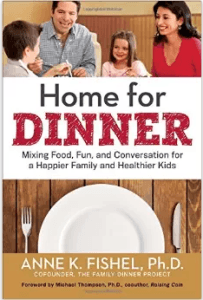 Multiple studies find that families who eat dinner together have children who are less likely to engage in drug abuse, experience teen pregnancy and/or drop-out of school. What makes dinner time so special?
Multiple studies find that families who eat dinner together have children who are less likely to engage in drug abuse, experience teen pregnancy and/or drop-out of school. What makes dinner time so special?
“There is nothing inherently magical about dinner, but for most families it is simply the most reliable time of the day to connect with one another. It is this connection that provides a powerful seat belt on the potholed road of childhood and adolescence,” writes Dr. Anne Fishel in her new book Home for Dinner: Mixing Food, Fun and Conversation for a Happier Family and Healthier Kids.
Distraction-free dinnertime conversation with your children helps them gain richer, more expansive vocabularies–even more so than reading books. And the stories you share with your kids about your youth or other relatives can help them form stronger self-identities as members of something greater than themselves. Through family storytelling, they will be more likely to internalize the values and goals that the family holds dear.
In her book, Dr. Fishel, a clinical psychologist, family therapist, blogger and co-founder of the Family Dinner Project, shares numerous tips, games and recipes that will re-energize your dinner hour.
Many of the games will appeal to the entire family, including the more withdrawn tween/teen set, like “how well do you know me?” in which each person writes down three answers to three different questions. The person in charge of the questions, collects the slips of paper and reads the answers aloud as everyone else tries to guess who said what.
I purchased this book on my Kindle, but I plan to go back and order the paperback version to make it easier for me to reference the many games and recipes that Fishel shares. Most of the recipes are simple and straightforward and can be done when you are in a hurry. Many are also kid-friendly like making pretzels together that your kids can form into animal or letter shapes or whatever strikes their fancy. Cooking with your kids not only helps them develop an important life skill and encourage the sampling of new foods, meal preparation is an excellent time to work side-by-side with your child and chat together.
Weaving in her own experiences with her two (now grown) sons, her love of cooking and her experience as a family therapist, Fishel’s book is a fun, easy read rich with valuable suggestions that any of us can integrate into meal time. And most importantly, these are proactive ways for us to take advantage of the fleeting time we have with our kids to refocus, reconnect and grow stronger and happier as a family.
